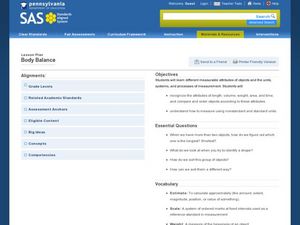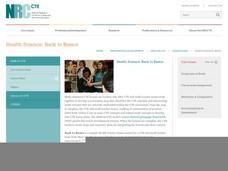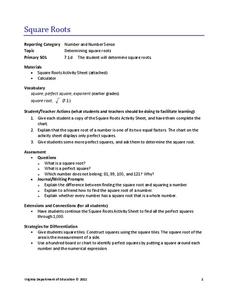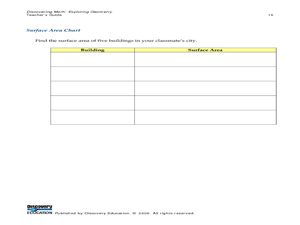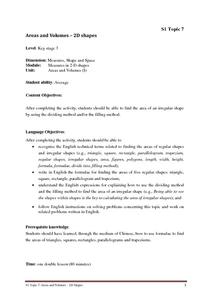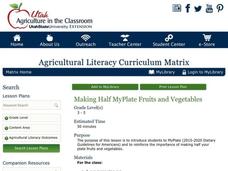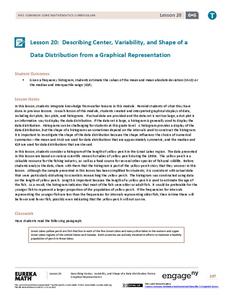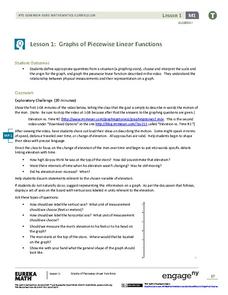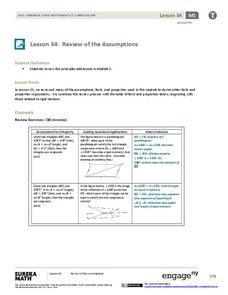Curated OER
Leaf Weight-Loss Plan
Learners measure the weight of a container of leaves daily to discover how quickly it grows lighter as the foliage dries.
Curated OER
Body Balance
Examine measurable characteristics of objects to build an understanding of the different ways you can discuss an object's size when comparing it to other objects. After whole group instruction, the class compares and organizes several...
National Research Center for Career and Technical Education
Health Science: Back to Basics
This lesson focuses on unit conversion, proportions, ratios, exponents, and the metric system. Discuss measurement with your math class and demonstrate how to solve several health-science word problems. Give learners a chance to visit an...
Curated OER
Rolling with Links
First graders explore geometry by completing a worksheet in class. In this non-standard measurement unit lesson, 1st graders discuss different techniques for measuring items without the use of a ruler. Students read several short stories...
Curated OER
Hands Around The World
Students engage in a lesson that is concerned with the concept of measurement. They conduct an experiment by measuring the amount of children needed to cover the distance of 50 yards. They calculate the distance around the world and how...
Curated OER
Cookie Creations
Students research ingredients typically found in cookies. They write recipes for creative cookies, using standard measurements and imaginative ingredients. Students illustrate the ingredients for their recipes and the baked product. They...
Virginia Department of Education
Square Roots
Square away any doubts about using a new resource. Pupils learn about squares and square roots in the mini-instructional activity. They complete a worksheet identifying roots of perfect squares up to 400.
Curated OER
Circles 1, 2, 3, 4
Here is a way to help your charges identify circles and spheres. In this shapes geometry and technology lesson, students identify and draw circles and explain the related attributes. They recognize circles and spheres while exploring...
California Academy of Science
Snakes and Lizards Length and Movement
Snakes and lizards can be very tiny or very long. Your class will get out their rulers to see just how big snakes and lizards can be. They discuss several different reptiles by reading the included animal fact cards, then each small...
EngageNY
The Definition of Sine, Cosine, and Tangent
Introduce your classes to a new world of mathematics. Pupils learn to call trigonometric ratios by their given names: sine, cosine, and tangent. They find ratios and use known ratios to discover missing sides of similar triangles.
EngageNY
Using Trigonometry to Determine Area
What do you do when you don't think you have enough information? You look for another way to do the problem! Pupils combine what they know about finding the area of a triangle and trigonometry to determine triangle area when they don't...
EngageNY
Secant Lines; Secant Lines That Meet Inside a Circle
Young mathematicians identify different cases of intersecting secant lines. They then investigate the case where secant lines meet inside a circle.
EngageNY
The Slope of a Non-Vertical Line
This activity introduces the idea of slope and defines it as a numerical measurement of the steepness of a line. Pupils then use the definition to compare lines, find positive and negative slopes, and notice their definition holds for...
Discovery Education
Discovering Math: Exploring Geometry
Apply geometric properties and formulae for surface area and volume by constructing a three-dimensional model of a city. Learners use similar and congruent figures and transformations to create a city of at least 10 buildings. They trade...
Government of Hong Kong
Areas and Volumes - 2D Shapes
Unfortunately for young mathematicians, the world isn't made entirely of parallelograms, triangles, and trapezoids. After first learning the area formulas for these common shapes, students apply this new knowledge to determine the area...
Agriculture in the Classroom
Making Half MyPlate Fruits and Vegetables
Establish healthy eating habits with a lesson focused around MyPlate's food recommendations and the importance of eating fruits and vegetables. Through class discussion and worksheet completion, scholars discuss the best choices of foods...
Curated OER
Math, Fractions, and Music
Students discover the relationship between musical rhythms and fractions. They add musical notes together to produce fractions and create addition and subtraction problems with musical notes. Students complete worksheets and create their...
Curated OER
Representing Data 1: Using Frequency Graphs
Here is a lesson that focuses on the use of frequency graphs to identify a range of measures and makes sense of data in a real-world context as well as constructing frequency graphs given information about the mean, median, and range of...
EngageNY
Describing Center, Variability, and Shape of a Data Distribution from a Graphical Representation
What is the typical length of a yellow perch? Pupils analyze a histogram of lengths for a sample of yellow perch from the Great Lakes. They determine which measures of center and variability are best to use based upon the shape of the...
EngageNY
Two Graphing Stories
Can you graph your story? Keep your classes interested by challenging them to graph a scenario and interpret the meaning of an intersection. Be sure they paty attention to the detail of a graph, including intercepts, slope,...
EngageNY
Graphs of Piecewise Linear Functions
Everybody loves video day! Grab your class's attention with this well-designed and engaging resource about graphing. The video introduces a scenario that will be graphed with a piecewise function, then makes a connection to domain...
EngageNY
Logarithms—How Many Digits Do You Need?
Forget your ID number? Your pupils learn to use logarithms to determine the number of digits or characters necessary to create individual ID numbers for all members of a group.
EngageNY
Review of the Assumptions (part 2)
Is the amount of information getting overwhelming for your geometry classes? Use this strategy as a way to organize information. The resource provides a handout of information studied in relation to triangle congruence. It includes a...
Teach Engineering
Exploring Bone Mineral Density
Bone up on bone density. The second installment of the seven-part series has pupils read articles on two different websites to learn about bone density and its measurement, as well as X-rays and other imaging tools. A quiz assesses their...



